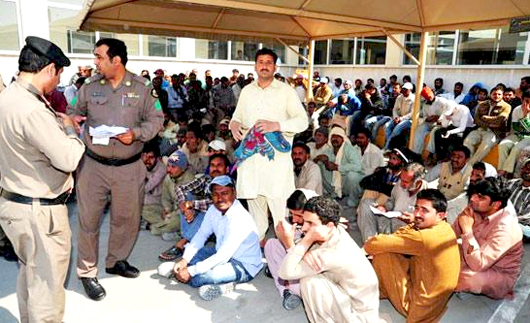
Madinah, Jul 9: Security officers in Saudi Arabia have arrested nearly 2,200 illegal foreign workers in Madinah and Hail and Baha this month for allegedly violating the country’s residency and labor regulations.
Madinah police arrested 884 Asian and African illegals during Ramadan following numerous inspection raids carried out at firms and establishments in the city.
Police in Madinah launched a crackdown on violators in cooperation with the Criminal Investigations Department, Special Task Force and Traffic Department, an official statement said, adding that the campaign is being supervised by Maj. Gen. Abdulhadi Al-Shahrani, Madinah region police director.
Security agencies in Hail, meanwhile, have arrested 305 violators during the last three days, said Col. Abdul Aziz Al-Zenaidi, Hail police spokesman.
“We have handed over the violators to authorities for punitive action,” he said. “We will continue our efforts to arrest labor law violators and residents without IDs throughout the region,” Al-Zenaidi said. In Baha, police have arrested more than 1,000 illegals.
In the meantime, Riyadh Municipality officials closed 23 restaurants in the capital for violating health regulations. They prevented 101 employees from working for not possessing health certificates and fulfilling hygienic conditions.
Normal 0 false false false EN-US X-NONE X-NONE MicrosoftInternetExplorer4
Ramadan raids net 2,200 illegal expats in Saudi
Madinah, Jul 9: Security officers in Saudi Arabia have arrested nearly 2,200 illegal foreign workers in Madinah and Hail and Baha this month for allegedly violating the country’s residency and labor regulations.
Madinah police arrested 884 Asian and African illegals during Ramadan following numerous inspection raids carried out at firms and establishments in the city.
Police in Madinah launched a crackdown on violators in cooperation with the Criminal Investigations Department, Special Task Force and Traffic Department, an official statement said, adding that the campaign is being supervised by Maj. Gen. Abdulhadi Al-Shahrani, Madinah region police director.
Security agencies in Hail, meanwhile, have arrested 305 violators during the last three days, said Col. Abdul Aziz Al-Zenaidi, Hail police spokesman.
“We have handed over the violators to authorities for punitive action,” he said. “We will continue our efforts to arrest labor law violators and residents without IDs throughout the region,” Al-Zenaidi said. In Baha, police have arrested more than 1,000 illegals.
In the meantime, Riyadh Municipality officials closed 23 restaurants in the capital for violating health regulations. They prevented 101 employees from working for not possessing health certificates and fulfilling hygienic conditions.






Comments
Add new comment